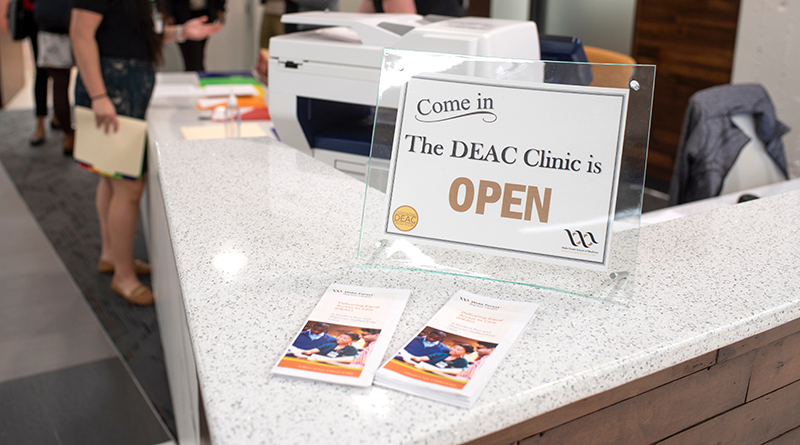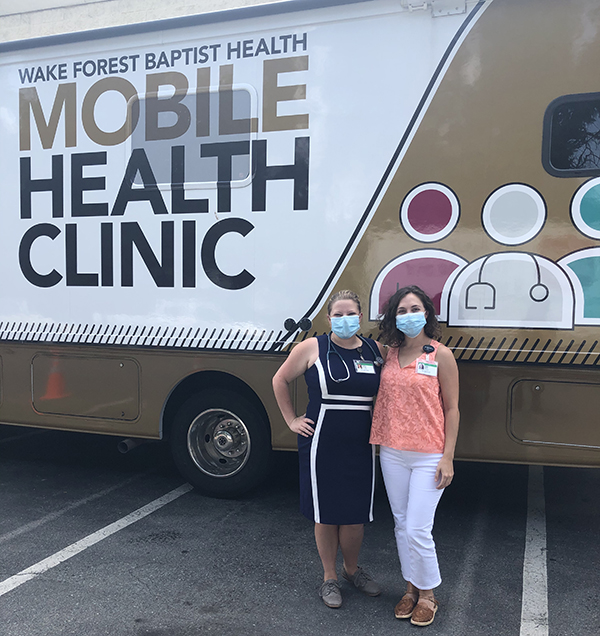Amidst the path of destruction caused by the COVID-19 pandemic and subsequent shutdowns lies a $20,000 hole in the budget of a beloved community resource in Winston-Salem.
As the pandemic has worn on, the Delivering Equal Access to Care (DEAC) Clinic faced a difficult challenge to remain open. Among those challenges was the need to cancel their annual gala, an important source of funding, leaving a sizable shortfall in the annual operating budget.
Not wanting to see the clinic struggle to stay open, a group of students from the Wake Forest PA program’s Emerging Leadership Program (ELP), along with students from PA Studies and the medical school, stepped up to fill the gap. With the goal of keeping the clinic up and running long into the future, they developed a plan to provide long-term, sustainable funding.

COVID Cancels Gala
DEAC is a student-run/physician-supervised clinic that provides health care services to underprivileged people in the community. The clinic serves patients who don’t have access to health insurance or who otherwise cannot afford care.
One of the goals of the clinic is to connect patients with providers who can provide long-term care. “We just want to help them take care of themselves better,” said Madison Simas, a Wake Forest School of Medicine student who volunteers at the clinic. The clinic also provides resources for smoking cessation, meal assistance, and other services. “There’s a lot that goes into DEAC, to target the health concerns we see most commonly in our community.”
The clinic also provides a way for students to apply what they learn in school in a real clinical environment. “It gives students an opportunity to get some one-on-one patient contact and further develop their skills,” said Corey Johnson, an ELP student.
When the pandemic shut down the clinic, those vital services had to be put on pause. Physicians and administrators rushed to establish a telehealth solution so that patients would have access to care.
But that didn’t solve the fundraising issue.
The DEAC Clinic gala, which is typically held in winter, was canceled in 2021. The event is open to anyone in the community, and features a live auction of items donated by local businesses.
The 2020 gala raised more than $22,000, the most the event ever raised. So when this year’s event was canceled, it left the clinic’s administrators with a big funding problem.
Long-Term Approach
Seeing a problem, the students took action. Simas, who serves as the fundraising chair for the DEAC Clinic, reached out to other students for help. Specifically, she tapped the ELP students, whose expertise was suited to the challenge.
“The business school has a program where the students work on a project,” said Simas, referring to the ELP program. “So we reached out to them, and they have been coming up with different avenues for us.”
 Learning about the challenge facing the DEAC Clinic, the ELP students saw a need for an approach that was year-round and long-term, rather than relying on the gala as a single, primary source of funding. “Our goal was to implement a sustainable fundraising model,” said Johnson. “We also want to increase awareness about the clinic among the donors, and the alumni of the medical school and the PA program.”
Learning about the challenge facing the DEAC Clinic, the ELP students saw a need for an approach that was year-round and long-term, rather than relying on the gala as a single, primary source of funding. “Our goal was to implement a sustainable fundraising model,” said Johnson. “We also want to increase awareness about the clinic among the donors, and the alumni of the medical school and the PA program.”
In addition, Johnson and her classmates saw a need to connect the clinic to the community and make fundraising events more accessible to more people. Some of the initiatives include a 5k run, fitness classes that allow participants to raise money, an annual direct-giving campaign, and other, smaller events held throughout the year.
Another important aspect is letting more people in the community know about the clinic and the work that it does through social media and publicity campaigns. “We’ll do some storytelling to explain to our donors how their dollars are going to help the community,” said Morgan Swan, an ELP student working on the project.
The ELP students also thought long-term from a personnel standpoint, taking steps to ensure people were in place to help execute fundraising and community engagements well into the future. “We had an idea to engage an undergraduate intern as an ongoing resource for the DEAC Clinic,” said Mary Heintzelman, an ELP student who is working on the fundraising project.
The goal of the overall plan is to cover all of the clinic’s fundraising needs and give them plenty of options. “We are giving DEAC Clinic board members a one-stop-shop for scheduled fundraising throughout the year,” added Swan.
Part of a Solution
The ELP students saw the DEAC Clinic’s fundraising challenges as an opportunity to do important work while putting their business skills to work.
“We’re passionate about getting healthcare to people in the community who don’t have access, and we have the business know-how to put DEAC in a better position to do that,” said Swan, who added that their business training in the ELP program prompted them to think strategically. “Our thinking was about the long-term, not just how can we fix the problem right now.”
Johnson agreed that their business training prepared them to take on the challenge of helping the clinic. “We learned to look at a big problem and then break it down into smaller subsections,” she added. “It’s implementing the problem-solving and management skills we’ve been learning in business school.”
Through their work, all of the students involved with the DEAC Clinic’s fundraising efforts are applying skills and gaining knowledge that will prepare them for their careers as health care providers. But they all cite the ability to give back to the community as being far more important.
“Health care inequities are present everywhere,” said Swan. “If we can be part of at least a small solution within our community, I think all of us are passionate about that.”
